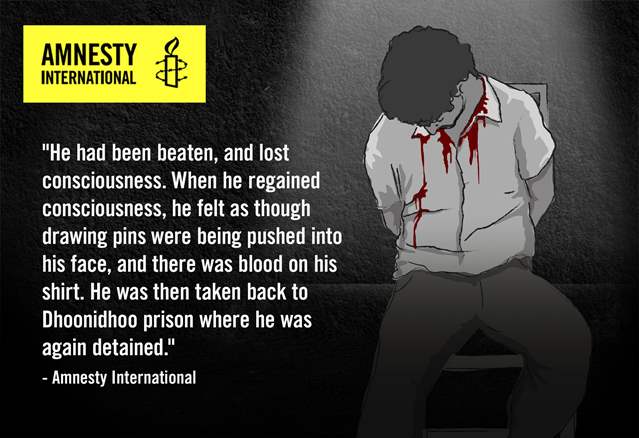Prisoner in Paradise tells the story of how Lahiru Madhushanka arrived in the Maldives to seek a business opportunity in 2015 and suddenly found himself accused of being a highly trained sniper trying to kill President Abdulla Yameen. His family and lawyer allege he has since been repeatedly denied access to legal representation, and while in custody has been subject to ill-treatment including prolonged solitary confinement and beatings with cables that caused him to temporarily lose hearing in one ear.
“Lahiru Madhushanka has endured the most harrowing ordeal. From the moment he was arrested, to his interrogation, to his imprisonment and his trial, his family and lawyer say he has been subject to a catalogue of serious human rights violations, including torture, that need to be independently investigated,” said Dinushika Dissanayake, Amnesty International’s South Asia Research Director.
“The case raises alarming questions about the Maldivian justice system and how the authorities treat detainees. It is also a test for the Sri Lankan government, which has only provided limited consular services and failed to adequately respond to the desperate appeals of Lahiru Madhushanka’s family and ensure a fair trial and humane detention conditions for him.”
The arrest and detention
In 2015, Lahiru Madhushanka left his work as a driver in Sri Lanka, according to his family and lawyer, in search of a new business opportunity. On 23 October 2015, while waiting for a flight back to Sri Lanka, he was arrested at the airport by plainclothes police who accused him of being involved in a plot to assassinate President Abdulla Yameen.
Lahiru Madhushanka is currently the co-accused with former Vice President Ahmed Adeeb. Lahiru Madhushanka’s family insists that he has never undergone any military training, let alone had experience as a sniper. The 2016 conviction of former Vice President Ahmed Adeeb has raised fair trial concerns itself, with parts of the trial taking place behind closed doors, secret documents produced from undisclosed sources, and key prosecution witnesses remaining anonymous.
As the briefing details, Lahiru Madhushanka was not produced before a judge within the first 24 hours of his arrest, as required under Maldivian law. The first remand hearing took place two days after his arrest. For the ensuing six months, he was not produced physically before a judge. There was no one to examine his physical condition after the interrogation.
Torture and other ill-treatment
Five days after his arrest in October 2015, Lahiru Madhushanka was beaten by the Maldivian police at their headquarters in Malé until he lost consciousness.
When he regained consciousness, according to his lawyer, he felt pins had been pushed into his face. Looking down at his shirt, he saw blood. According to Lahiru Madhushanka’s family, during visits he told them of how he was kicked and beaten with cables.
The beatings, Lahiru Madhushanka’s family allege, caused him to temporarily lose hearing in one ear.
Earlier this year, in August, Lahiru Madhushanka was transferred to solitary confinement. No reason was provided by the prison authorities. His lawyer was not even informed. For nearly a month, he was placed in a dark cell, with no light, according to his lawyer – who only learned of the situation from other inmates.
When he is held in a regular cell, Lahiru Madhushanka is only allowed out of his cell once or twice a month. The only other times he has left his cell is to see a doctor, or the few times he has been allowed to see his lawyer.
At Maafushi prison, Lahiru Madhushanka’ health also deteriorated because of the food he was given to eat. In May 2018, he fell violently ill after a meal provided during the Muslim holy month of Ramadan. One of his cellmates saw cockroaches in their food.
Unfair trial
Lahiru Madhushanka was unable to even understand the early proceedings against him – which were conducted in Divehi, the national language of the Maldives, which he did not speak.
Except for the first three, all hearings in Lahiru Madhushanka’s case were held behind closed doors. The five prosecution witnesses presented remained secret – only being identified by a number. As a result, Lahiru Madhushanka’s lawyer was denied the chance to effectively cross-examine these witnesses.
In one hearing, according to Lahiru Madhushanka’s lawyer, two of the witnesses even revealed that they had been forced to provide false evidence under duress by the Maldivian police. One of the witnesses told the court that he had been forced to appear after the Maldivian police arrested and tortured his younger brother.
Whenever he met his lawyer in Malé, the prison officers would linger within earshot of their conversations, denying them the ability to speak openly about the case. For three months this year, Lahiru Madhushanka’s lawyer was unable to see him as the authorities forced her to negotiate a series of bureaucratic hurdles.
“If proved, the cruel and inhuman and degrading conditions within which Lahiru Madhushanka has been confined are a stain on the Maldivian justice system. No human being should be treated in this way. All the more reason why a thorough investigation should promptly be launched by the Maldivian authorities,” said Dinushika Dissanayake.
“The new President of the Maldives, who will be sworn in next month, must ensure that all prisoners are treated humanely and tried in courts where justice is worthy of its name.”

